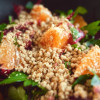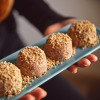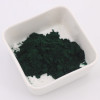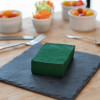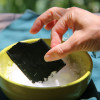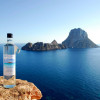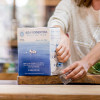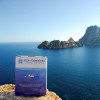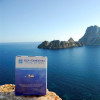Pregnancy and its preparation are special moments to take care of your health. Everything you undertake before and during your pregnancy will have a direct impact on the family life you will experience afterward.
It is an ideal time to adopt new dietary and lifestyle habits if you haven't done so before.
Pregnancy and its nutritional needs
Creating a baby is a bit like a recipe. When all the ingredients are mixed with care, the newborn will have a great chance of starting life well.
But if you cook with only nine of the twelve ingredients, forgetting to add spices and enthusiasm, the final result may not be as tasty or elaborate as expected.
This example can, in a way, be transposed to pregnancy: when certain nutrients are missing, for example, the essential B vitamins like B9, it can lead to major physical issues for the child and also cause emotional disturbances for the mother before and after childbirth.
To prevent any deficiency, it is essential to stock up on vitamins and minerals throughout these nine months.
Often, gynecologists or general practitioners believe that modern diet and multivitamin complexes sold in pharmacies are sufficient to address potential deficiencies. As naturopaths, we often observe that these basic supplements are absolutely not enough to replenish the body with essential elements for the health of the future baby and especially the mother, who often depletes her minerals for the benefit of the child who will always draw the nutrients he needs during pregnancy and then breastfeeding.
One of the signs of a lack of vitamins and minerals is, for example, the famous cravings of pregnant women. Indeed, they reflect a demand (or sometimes even a desperate cry) from the body to obtain doses of basic nutrients. But unfortunately, our so-called modern diet, even organic, is deficient in vitamins, minerals, trace elements, and quality fatty acids. Thus, we get calories but hardly replenish our essential needs with each bite.
The multivitamin complexes sold in pharmacies are interesting and can be a good base. However, they often contain questionable additives, such as titanium dioxide, and some dietary supplements of this kind are of poor quality and/or derived from synthetic molecules, thus not always optimally assimilated by the body.
From a naturopathic or natural and holistic health perspective, superfoods are the best allies during this precious period, as throughout our lives.
What is a superfood and which ones should be favored during pregnancy?
A superfood is a product or food with significant nutritional value, meaning it is naturally very rich in amino acids, vitamins, minerals, trace elements, and enzymes.
The advantage of consuming this kind of product is that the body hardly needs to make any effort to assimilate what it needs and eliminate what is in excess, unlike some synthetic products. It is therefore the golden path to take care of your health, prevent deficiencies, and balance your nutritional needs.
Today we are going to present three nutrient-rich treasures, particularly suitable for pregnancy: spirulina, pollen, and seawater plasma.
Spirulina
Spirulina is an ancient freshwater algae, already consumed for its virtues during the time of the Aztecs.
Rich in amino acids (proteins), antioxidants (notably phycocyanin), chlorophyll, B and E vitamins, iron, calcium, magnesium: it is a true nutritional bomb for all ages.
Its positive effects on health are diverse and remarkable.
Indeed, Spirulina:
boosts immunity
increases physical performance and improves mental alertness
fights against free radicals and thus against cellular degeneration
reduces inflammation
prevents cardiovascular diseases by regulating triglycerides and cholesterol balance
combats and prevents anemia
regulates blood sugar
harmonizes blood pressure
prevents nutritional deficiencies due to overly industrial or refined diets or due to special needs or diets
During pregnancy, spirulina provides essential vitamins and minerals (B12 and iron in particular, but also magnesium, calcium, Vit C, and E) as supplements to a balanced diet.
In some countries, this blue algae is even used to combat malnutrition due to poor living conditions. Three courses of spirulina are often enough for malnourished children to catch up on their deficiencies.
However, its nutrient content varies depending on its place of cultivation and production method (drying temperature, compression, etc.), so it is highly recommended to consume this superfood by prioritizing quality sources, such as Spirulina.
Algae also accumulate heavy metals such as lead, arsenic, and cadmium when the cultivation environment is polluted, another reason to pay attention to its origin.
Pollen
It is a cluster of tiny ovoid seeds, which are the male fertilizing element of flowers. Bees and other pollinating insects transport pollen to the female organ (pistil) of other flowers, thus enabling the reproduction of various plant species.
This pollen, mixed with nectar, also serves as food for the bee colony, particularly for young larvae during the flowering period.
When talking about pollen as a superfood, it is important to distinguish between two types: dry and fresh. Both are rich in amino acids, carbohydrates, minerals (calcium, iron, magnesium, phosphorus, potassium, etc.), B vitamins, and antioxidants. However, these qualities are better preserved and more potent in the fresh version. The presence of lactic ferments and enzymes is also maintained, which is not the case in the usual dried pollen.
This overall fortifier has many virtues:
boosts immunity
combats fatigue
restores during convalescence periods
enhances memory
acts on the beauty of keratinous tissues (nails and hair)
rebalances the nervous system
It also gently regulates intestinal peristalsis, which is a great advantage during pregnancy when it is slowed down. Indeed, the baby's weight sometimes compresses certain organs and thus slows down the natural evacuation of stools. It is essential to restore transit as quickly as possible, as stagnant waste in the colon is just a few centimeters from the fetus and can therefore intoxicate it over the weeks.
Bee pollen should not be confused with wind-borne pollen, which sometimes causes allergies. On the contrary, it even helps reduce the symptoms of allergic rhinitis due to its anti-inflammatory and antihistamine action.
Good to know: You can also dissolve a little quality pollen in milk or water bottles so that the child can benefit from the pollen from an early age. Always consult your pediatrician or specialist to ensure it is suitable for your child.
Marine Plasma
Marine plasma is also called seawater or Quinton serum. Its name comes from the French biologist René Quinton, as he dedicated many years of his life to the scientific and therapeutic study of seawater.
This serum, harvested in specific areas, namely in marine vortices (whirlpools), contains more than 80 highly bioavailable trace elements from the Mendeleev table. It has the particularity of being almost identical to blood plasma. It is interesting to know that nurses in the past used to inject this marine plasma into patients' veins to give them a health boost. It was reimbursed in France by social security until the 1980s.
This seawater, so rich in nutrients, greatly contributes to the good health of the mother and baby. It reduces nausea, low blood pressure, hypoglycemia, and facilitates difficult pregnancies by reducing the risk of miscarriage and enhancing fetal development. Even genetic malformations and complications can be improved thanks to this true elixir of life.
It is recommended to gradually increase the doses of seawater, starting with 30ml per day during the 1st trimester and ending with 100ml per day during the 3rd trimester and the first months of the child's life.
Marine plasma should be taken outside of meals in a glass of water in isotonic form during pregnancy. Ideally, let it sit in your palate for a few seconds so that the trace elements can penetrate the sublingual capillaries.
Since it is a salt-rich water, it is important to monitor blood pressure throughout its intake, especially during the last trimester of pregnancy.
Marine plasma is also ideal during breastfeeding. You can continue to provide its benefits to your baby through breast milk and later by diluting it with suitable water in their bottle or cup.
Ibiza y Formentera marine plasma is of exceptional quality, as it is harvested from seabeds with the best concentration of phytoplankton and respecting the earth's biorhythms. It is also one of the few companies that still extracts this natural treasure from a boat in the open sea.
Health and Natural Elements as Blessings
There are also other superfoods that can be consumed throughout pregnancy, such as sprouted seeds (well washed), royal jelly, or coconut water.
Nature offers solutions and blessings accessible to everyone, therefore, tailored support for each woman and each pregnancy can be very constructive in addition to the usual medical follow-up. Thus, we invite you to contact a naturopath and/or a natural health practitioner (doula, haptonomy, hypnobirthing, osteopath, etc.) to make the most of this very important period.
Justine Lamboley is a naturopath and Heilpraktiker. She is the author of the support program for conception and pregnancy, up to the birth of your child "natural pregnancy" which allows you to have a natural pregnancy in great shape, and prepare for a physiological childbirth.
Download here, the free ebook to learn about "The 7 essential foods for a natural pregnancy in great shape"




